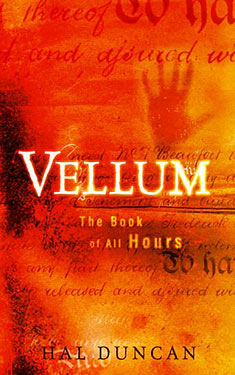Hal Duncan
Completed 7/5/2020,
Reviewed 7/5/2020
3 stars
I literally
don’t know what I just read. It’s
beautiful, but nearly indecipherable. The
prose is magnificent, almost poetic, with occasional alliteration as well as
run on sentences that make internal sense.
It has many story lines, including at least one that is meta. What it doesn’t have is a discernable plot. The story line is non-linear, jumping between
past, ancient past, future, and present.
If it weren’t for the book’s description on jacket flap, I would have
never known what it was supposed to be about.
Reading it was a cross between joy and penance. I’ve read lots of reviews of the book, and
they are all over the place. Many people
love it, many people hate it. Enough
people gave it love to get several awards nominations, winning the Gaylactic
Spectrum Award for 2007. I would not have been so generous. That probably means I wouldn’t like James
Joyce’s “Ulysses” if I were ever to attempt that novel.
 So the
Vellum is the fabric of everything and somewhere in it was lost The Book of All
Hours. It is a book that supposedly
contains the accounting of every being that’s ever existed. It is effectively the work of God. It is sought after by angels and demons who walk
the earth and are at battle with each other.
They used to be human. Now they
are unkin. The story more or less
follows several unkin. Some used to be ancient
gods, somehow became human, then became unkin.
A lot of time is spent with Seamus Fannin, an unkin who does not take a
side in the battle, and Phreedom Messanger, who once was a Sumerian goddess,
and her brother Tommy. There are some
gay characters who seem to part of the meta-story, but also appear within other
story lines. There is a prologue that
introduces us to several characters who find the book and an epilogue that
seems to be about some people after the battle.
So the
Vellum is the fabric of everything and somewhere in it was lost The Book of All
Hours. It is a book that supposedly
contains the accounting of every being that’s ever existed. It is effectively the work of God. It is sought after by angels and demons who walk
the earth and are at battle with each other.
They used to be human. Now they
are unkin. The story more or less
follows several unkin. Some used to be ancient
gods, somehow became human, then became unkin.
A lot of time is spent with Seamus Fannin, an unkin who does not take a
side in the battle, and Phreedom Messanger, who once was a Sumerian goddess,
and her brother Tommy. There are some
gay characters who seem to part of the meta-story, but also appear within other
story lines. There is a prologue that
introduces us to several characters who find the book and an epilogue that
seems to be about some people after the battle.
At this
point in my reviews, I usually launch into character development, but this time
I can’t. It’s difficult to describe any
one character, but I can tell you what I’ve gleaned. As I said in the plot, we do spend a lot of
time with Seamus, who doesn’t take sides in the war between angels and demons. He, like Phreedom, existed in ancient times. He also fought in WWI and in the Spanish
Civil War. He also exists in the book’s
present, 2017, which is actually the tens year after the publish date, so it’s
actually the future. He says fooking a
lot, is ornery, and gets into a lot of trouble throughout his long life. He goes on long soliloquies that are amazing
to read. Phreedom was interesting as the
Sumerian queen and goddess Inanna. In
the present, she’s a biker chick trying to find her brother Tommy. He appears several times in the book and was
also the brother of Inanna. He’s also known
as Puck, Tamuz, and Matthew Shepard, the gay young man who was murdered in Wyoming
about twenty-five years ago.
There’s one
character, Jack, who I think is an angel.
And I think he was in the prologue, and maybe in the epilogue. It was hard to tell if they were different
Jacks or the same person. He went by the
name Jack Carter and Jack Flash, as in Jumpin’.
We spend a lot of time with him, but I never figured him out. I did get that he was in love with Tommy.
The who
mixing of timelines was immensely confusing.
As one reviewer said, it’s like the author wrote out multiple stories on
index cards, shuffled them, that was what was published. The way I resigned myself to reading the book
was to just take every paragraph as an independent thought. If it continued the thought from the previous
paragraph, great. If I was able to
relate it to someone or something I already read, great. If I couldn’t figure out where it belonged or
why it was even brought up, I just enjoyed the prose and continued on. It’s not a great way to read a book, but it got
me through it.
Why then
would I give the book three stars out of five?
Normally, three stars means good.
Was this book good? I can’t say,
but neither can I say that the book was excellent or terrible. It was just very hard to read when I was
looking for coherency. Once I gave up,
it became like poetry; I can marvel at the form and the effort, but I don’t get
it. Three stars seems like a decent
compromise. This book is the first of a
duology. The second book is “Ink”, but I
just don’t think I want to make the effort to get through that book as
well.
No comments:
Post a Comment